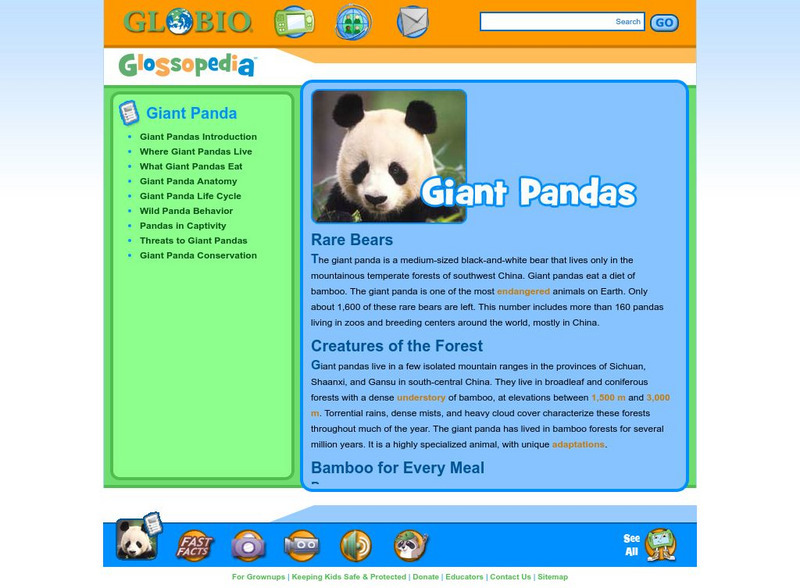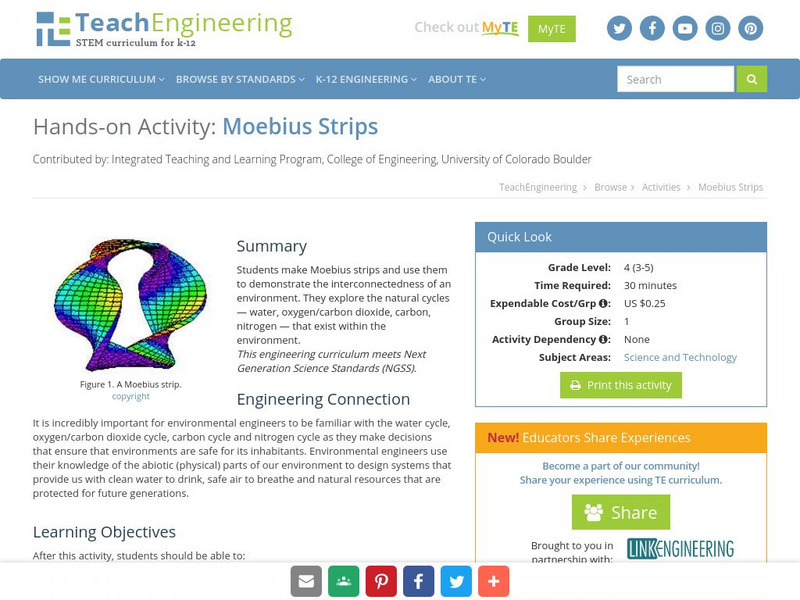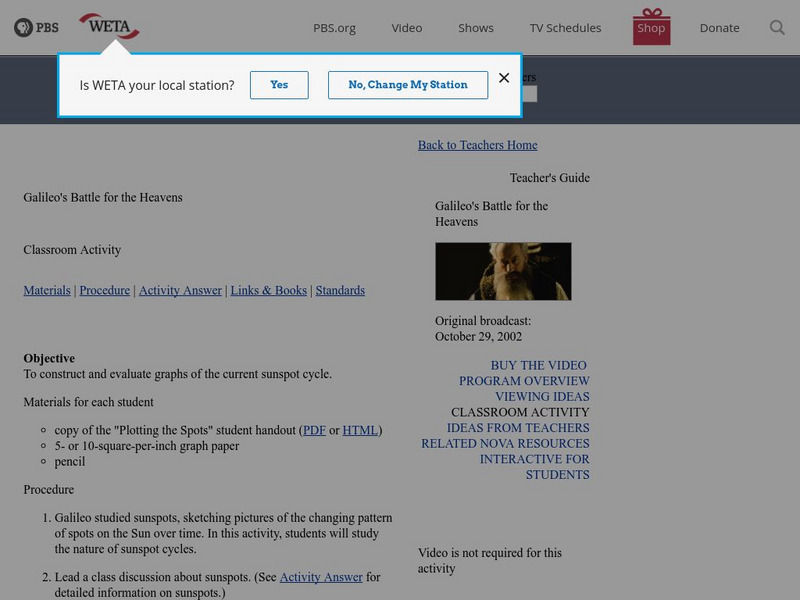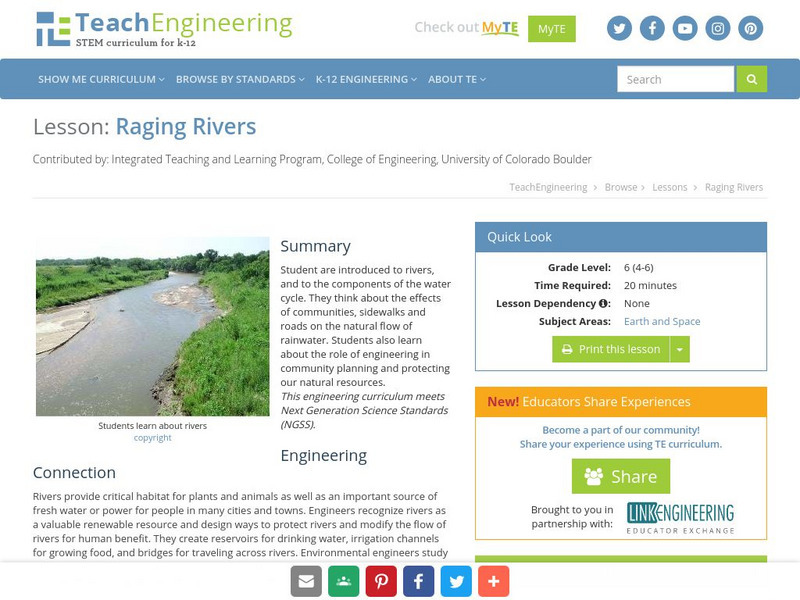Hi, what do you want to do?
Encyclopedia of Earth
Encyclopedia of Earth: Physics & Chemistry: Phosphate
Discusses what phosphates are, their role in the phosphorous cycle, where they occur in the natural world, their chemistry, and the impact of the use of phosphate fertilizers in agriculture.
Other
The Geological Society: Climate Change: Evidence From the Geological Record
In this statement, The Geological Society describes the changes that are happening to the global climate in terms of what evidence has been observed in our geological history. For example, what happened during past events of rapid...
Globio
Glossopedia: Giant Panda
Giant Pandas only live in the mountains of southwest China. This article focuses on Giant Panda habitat, diet, life cycle and reproduction. Extensive information is given on panda babies and the contrast between life in the wild and life...
Khan Academy
Khan Academy: Lesson Summary: Unemployment
In this lesson summary review and remind yourself of the key terms and calculations used in measuring unemployment, the labor force, the unemployment rate, the labor force participation rate, and the natural rate of unemployment. Topics...
TeachEngineering
Teach Engineering: Environment
Through 10 lessons and more than 20 hands-on activities, students are introduced to the concept of an environment and the many interactions within it. As they learn about natural and human-made environments, as well as renewable and...
PBS
Pbs Learning Media: Cloud Age Two
In this video segment from Nature, Cloud, a two-year-old horse, interacts with his family in the wild. [3:23]
Other
Few: Human Impact on the Environment & Environmental Impact on Humans
Human beings have an enormous impact on the natural environment, and ultimately on each other. The way we chose to house, clothe, shelter, and meet the needs for vital resources such as food, energy, and water, not only affect the...
National Pest Managment Association
Pest World for Kids: Termitology
An inquiry based lesson plan that delves into termite biology, distribution and habitat, life cycle, social structure, and the role of termites in nature and the food chain.
Smithsonian Institution
National Museum of Natural History: American Mammals: Mexican Long Tongued Bat
Mexican long-tongued bats feed on fruits, pollen, nectar, and probably insects. The populations that summer in the United States migrate to Mexico and northern Central America in winter, following the blooming cycle of plants such as...
TeachEngineering
Teach Engineering: Moebius Strips
In this activity, students make Moebius strips and use them to demonstrate the interconnectedness of an environment. They will explore the natural cycles (water, oxygen/carbon dioxide, carbon, nitrogen) within the environment.
PBS
Pbs Teachers: Galileo's Battle for the Heavens Plotting Sun Spots
In this activity, students follow in Galileo's footsteps as they examine the nature of sunspot cycles, define solar minimum and solar maximum, and graph data for a solar cycle. Then they will predict the next solar maximum and when the...
TeachEngineering
Teach Engineering: Raging Rivers
The lesson introduces students to the steps of the water cycle and rivers. They think about the effects of communities, sidewalks and roads on the natural flow of rainwater. Students also learn about the role of engineering in community...
Read Works
Read Works: 1st Grade Lesson: Purposes for Reading
[Free Registration/Login Required] A lesson plan in which young scholars use the books Nature's Food Chains: What Polar Animals Eat by Joanne Mattern, Life Cycle of a Frog by Angela Royston, and Froggy Goes to School by Jonathan London...
Utah Education Network
Uen: 1st Grade Act. 12: The Little House
This lesson introduces students to cycles and patterns. Students will engage in shared reading. Students will learn word patterns and repetition in language cycles. Students will learn that time in math and cycles of change in science...
PBS
Pbs Teachers: The Climate Change Skeptic's Argument
Lesson plan examines the possibility that the contemporary climate change is due to natural solar cycles. Objectives are to review the evidence of total solar irradiance, analyze data to understand the influence of solar variability, and...
Khan Academy
Khan Academy: Beliefs of Hinduism
Common to virtually all Hindus are certain beliefs, including, but not limited to, the following: 1. a belief in many gods, which are seen as manifestations of a single unity. These deities are linked to universal and natural processes....
Alabama Learning Exchange
Alex: Jack's Beans
During this lesson, the classic story of Jack and the Bean Stalk will spark an interest in plants with students. Students will explore the Internet, take a nature walk, and make observations to learn more about plants. A brochure will...
TeachEngineering
Teach Engineering: Biodomes
Students explore the biosphere's environments and ecosystems, learning along the way about the plants, animals, resources and natural cycles of our planet. Over the course of lessons 2-6, students use their growing understanding of...
TeachEngineering
Teach Engineering: Swim to and From the Sea!
Students are introduced to the basic biology behind Pacific salmon migration and the many engineered Columbia River dam structures that aid in their passage through the river's hydroelectric dams. Students apply what they learn about the...
ArtsNow
Arts Now Learning: Grade 3: Rock N Art
In this arts integrated unit, 3rd graders will explore Rocks and Soil. These projects focus on bringing multiple art forms to the Earth Sciences for third graders. Students will focus on comparing and contrasting the 3 types of rocks, as...
Smithsonian Institution
National Museum of the American Indian: Indigenous Geography
Indigenous Geography helps you develop key understandings on nine different dimensions as they relate to six Native communities located in the Western Hemisphere. Learn about the creation stories, place boundaries and landmarks, calendar...
TeachEngineering
Teach Engineering: Got Energy? Spinning a Food Web
Students learn about energy flow in food webs, including the roles of the sun, producers, consumers and decomposers in the energy cycle. They model a food web and create diagrams of food webs using their own drawings and/or images from...
Writing Fix
Writing Fix: Season Mandala
In this instructional activity, Have You Seen Trees?, a book written by Joanne Oppenheim, and The Seasons of Arnold's Apple Tree, a book written by Gail Gibbons, are used as mentor texts. As a post-reading activity, learners will record...
Other popular searches
- Cycles in Nature Powerpoint
- Life Cycles in Nature
- Different Cycles in Nature
- Search Cycles in Nature
- Cycles in Nature Lab
- Cycles in Nature Maze

























